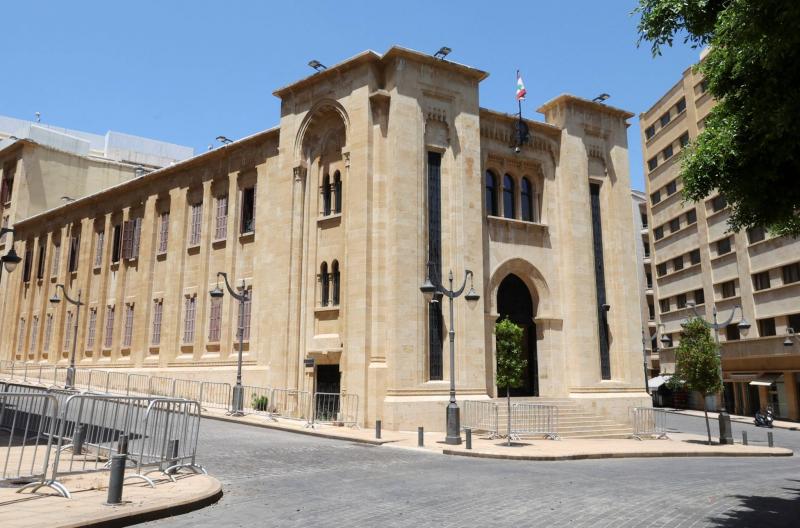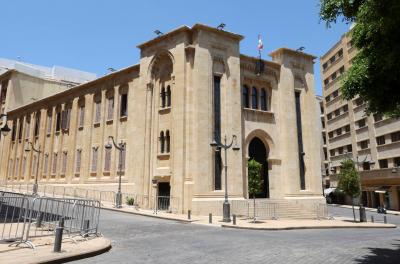There are many scenarios and expectations surrounding the presidential election session scheduled for June 14 this month. However, the certain fact acknowledged by all is that the session will not produce a president due to the sharp division between two main factions capable of obstruction, yet unable to bring any figure or candidate to the presidency. Consequently, the scene of these folkloric sessions, described as absurd, may repeat over several sessions or a dozen futile meetings while the country is mired in its worst crises, and it cannot continue down this decline as all parties recognize.
Five months have passed since the eleventh presidential election session, held on January 12, where Speaker Nabih Berri wanted to stop what he called a "mockery that undermines the parliament." He had previously announced a deadline of June 15 for electing a president, urging the opposition to nominate a candidate to present to the assembly and allow the president to win through democratic competition. After the opposition forces and the "Free Patriotic Movement" announced the nomination of former Minister Jihad Azour, Berri called for an electoral session next Wednesday, June 14, which stirred considerable discussion regarding the reasons prompting the Speaker to postpone the session until next week instead of scheduling it this week based on the principle of "the best is what comes soon." However, one deputy confirmed to "Warda" that it is within the Speaker's authority to set the session as he sees fit, but Berri likely wanted to give space to the parties in case they could reach some formula that might extract the presidential election from its current deadlock, also taking into consideration the scheduled timetable for parliamentary committee sessions. Another deputy viewed the invitation as a commitment to the timeframe previously established by the Speaker while also being satisfying to Bkerke, which sent Bishop Paul Abdel Sater to Haret Hreik to consult on the new presidential developments.
It is not unlikely that the white paper will be the main competitor to Azour. Certainly, the forthcoming session will serve as a pulse check, gauging the number of votes that each candidate might receive. Since Azour was announced as the official candidate and the "Shiite duo" maintained their support for "Maronite" leader Sleiman Frangieh, the "polls" related to the presidential elections are intensifying behind the scenes of both factions. Supporters of Azour's nomination believe he can secure 65 votes, despite the unclear stance of the "Democratic Gathering," which is expected to announce its position after an upcoming meeting on Thursday, as deputies assert they will not declare any stance before the meeting. Some reports indicate a direction toward supporting Azour, especially since he was on the list presented by Progressive Socialist Party leader Walid Jumblatt during his presidential initiative months ago. The "National Moderation" bloc and independent Sunni deputies have not yet announced which candidates they will support, along with some reformist deputies with whom Azour is discussing his work plan, priorities, and rescue strategies. According to "Warda" information, the opposition aspires to reach 65 votes, which would pressure the opposing faction and hold them accountable for the vacancy, especially since most Christian forces will vote for Azour, which means that if he secures 65 votes, he would be the elected president but with a suspended mandate.
Meanwhile, the "Shiite duo" is holding coordination meetings to study the steps and options that can be taken in opposition to the rival team's plan to "overthrow Frangieh's nomination." Meetings will expand among all allies in the coming days to discuss potential scenarios for the session. Sources allied with the "duo" told our site that all options are on the table, including boycotting the first session or disrupting the quorum of the second round, by moving towards voting for the white paper, as Azour's nomination is "merely a maneuver aimed at undermining Frangieh's nomination rather than facing it directly, and our candidate does not succumb to political bargaining." Thus, it is not unlikely that the white paper will be Azour's main competitor. Speaker Berri has emphasized in a press interview that he supports Frangieh, stating, "We and our allies voted for the white paper before announcing our support for Frangieh. There are other blocs that wish to vote with a white paper as they are dissatisfied with the candidates."
The successive routine sessions, from which the Lebanese have grown weary, will dominate the political scene in the coming phase. Meanwhile, observers affirm that the situation of the upcoming session is murky, making it nearly impossible to accurately count the votes in favor of either Frangieh or Azour, as many deputies will only reveal their positions at the ballot box, particularly those claiming they will not vote for any candidate not agreed upon by the majority of the parties in the country. However, at the same time, it must be acknowledged that the twelfth session will carry an element of suspense that will break the monotony and dullness of the preceding sessions, despite the likelihood of a return to the scenario of the initial election sessions, where the "duo" participates in the first session and then disrupts the quorum of the second round.
This scenario is described by one opposition deputy in a statement to "Warda" as "a coup operation to disrupt the entitlement, depriving Lebanon of the moment of recovery and catching its breath." Continuous obstruction does not belong to the constitutional game but may serve as a tactic during a short phase. Therefore, it is the responsibility of deputies today more than ever to fulfill their constitutional duties. Although the constitution grants them the right not to attend or to vote with a white paper or abstain from voting or to boycott, it should not turn into a controlling approach towards the political process and significant constitutional obligations in a collapsing country; otherwise, it is better to shut down the parliament. Those who drafted the constitution never presumed ill intent from its implementers, and thus they prescribe what must be done, not what should not be done. The constitution is not a joke and stands above all political whims.
In light of this presidential status quo and the difficult equation in parliament, one reformist deputy who will vote for Azour asks: "Why don't we allow the democratic process to unfold, and let us all head to parliament, staying there for consecutive sessions until a president is elected? Whoever receives the most votes becomes president." It is illogical to return to square one in the presidential elections, as the country's situation does not allow for it, nor does it fulfill the principles of democracy in constitutional entitlements. It would be better for deputies to prioritize the issue of electing a president and not contribute to dismantling the country and its institutions further.
In any case, tomorrow will reveal itself soon, and the non-productive electoral session will take place in a few days, with the return of the scenario of successive routine sessions, from which the Lebanese have grown weary, which will dominate the political scene until a moment arrives when everyone will come down from the tree and sit at the same table to agree on a name. This means that the stage of selecting a third character has begun, but it is difficult to determine its duration. Until then, there will be no president in the foreseeable future, despite the sorrow felt by many over the loss of the democratic game, especially within constitutional institutions and significant entitlements. A quick glance at the 1970 session, when Sleiman Frangieh won over candidate Elias Sarkis by a single vote, underscores "the extent of the decline we have reached," according to one political analyst.




